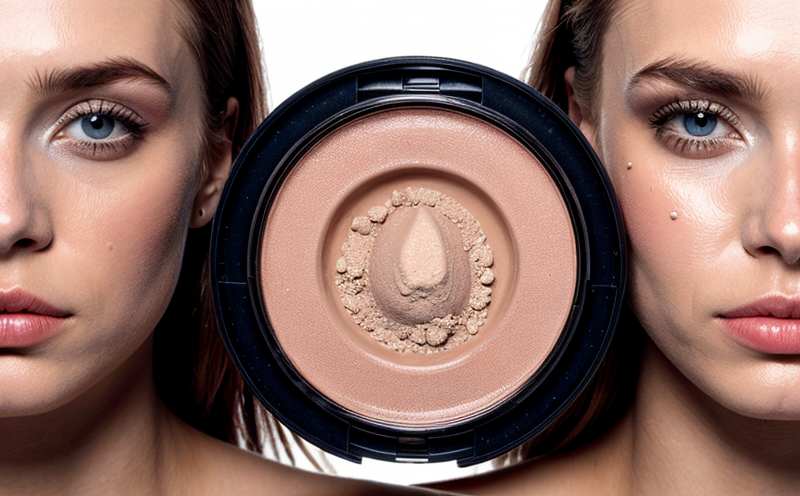Total Dissolved Metal Content Testing in Cosmetics
Ensuring product safety and compliance with international regulations is a critical aspect of the cosmetics industry. One key test that plays an essential role in this regard is Total Dissolved Metal Content (TDMC) testing in cosmetics. This service involves quantifying trace metals present in cosmetic formulations, which can include ingredients like water, surfactants, preservatives, and other additives used during production. The presence of heavy metals such as lead, mercury, cadmium, arsenic, and others must be kept within safe limits to prevent adverse health effects on consumers.
The testing process typically involves the following steps: sample preparation, digestion, analysis using advanced instrumentation like inductively coupled plasma mass spectrometry (ICP-MS) or atomic absorption spectroscopy (AAS), and finally reporting results according to international standards such as ISO 17025, IEC 62321, and ASTM E1496. This ensures that the testing is both precise and accurate.
TDMC testing helps manufacturers identify potential sources of contamination from raw materials, production processes, or packaging materials. It also assists in ensuring product quality by detecting trace amounts of metals that could affect the stability or performance of the final cosmetic product. By adhering to these stringent testing protocols, companies can maintain their reputation for producing safe and effective cosmetics.
Regulatory frameworks like the European Union’s Cosmetics Regulation (EC 1272/2006) mandate specific limits on metal content in cosmetics to protect public health. Therefore, conducting TDMC tests is not just a best practice but also a legal requirement for companies operating within these jurisdictions.
Understanding the scope of this testing requires an awareness of various factors including the types of metals being tested, their concentrations, and how they interact with other ingredients in cosmetic formulas. For instance, certain levels of metal ions might be necessary to achieve desired properties such as color retention or texture stability; however, excessive amounts can lead to toxicity issues.
In summary, Total Dissolved Metal Content Testing is crucial for maintaining product safety standards across the cosmetics industry. Through rigorous analytical methods and adherence to established guidelines, laboratories like Eurolab provide reliable data that support informed decision-making throughout the development lifecycle of cosmetic products.
Why It Matters
The importance of Total Dissolved Metal Content (TDMC) testing in cosmetics cannot be overstated. Compliance with regulatory requirements is paramount for any business involved in manufacturing or distributing personal care products. Non-compliance can result in significant financial penalties, damage to brand reputation, and even legal action.
- Regulatory Compliance: Many countries have strict regulations governing the levels of heavy metals allowed in cosmetics due to concerns about their potential toxicity. For example, the EU’s Cosmetics Regulation sets limits for various metal contaminants based on safety assessments conducted by experts from across Europe.
- Consumer Protection: Ensuring that cosmetic products do not contain harmful amounts of metals protects consumers’ health and well-being. Excessive exposure to certain elements can lead to serious illnesses, including neurological damage or cancer.
- Risk Management: By identifying potential sources of metal contamination early on in the production process, manufacturers can implement corrective actions before they become a problem. This proactive approach helps reduce risks associated with product recalls and other adverse events.
- Brand Reputation: A reputation for producing safe, high-quality products is essential for maintaining customer loyalty and attracting new customers. Demonstrating commitment to rigorous testing procedures enhances trust between brands and consumers.
In conclusion, TDMC testing is vital not only from a legal standpoint but also because it contributes directly to protecting consumer health while upholding ethical business practices.
Eurolab Advantages
At Eurolab, we pride ourselves on offering comprehensive Total Dissolved Metal Content (TDMC) testing services that go beyond mere compliance. Our state-of-the-art facilities and experienced scientific staff ensure that every test is conducted with utmost precision and reliability.
- Innovative Equipment: We utilize cutting-edge technologies such as multi-channel ICP-MS systems to deliver accurate results quickly.
- Expertise: Our team comprises highly skilled professionals who understand the nuances of TDMC testing, allowing us to provide tailored advice and recommendations where needed.
- Certification: Eurolab holds ISO 17025 accreditation, ensuring our services meet international quality assurance standards.
- Comprehensive Reporting: Beyond just numerical data points, we offer detailed analytical reports that interpret findings in the context of broader industry trends and best practices.
Choose Eurolab for Total Dissolved Metal Content testing—where excellence meets expertise.





